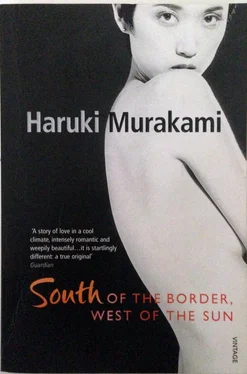But she didn’t come. Maybe she was too busy to find time to see me, I mused. But three months was way too long a gap. Even supposing she couldn’t come to see me, at least she could pick up the phone and call. She’d forgotten all about me, I decided. I wasn’t so important to her, after all. That hurt, as if a small hole had opened up in my heart. She never should have said that she might come again. Promises—even vague ones like that—linger in your mind.
But in early February, again on a rainy night she appeared. It was a quiet, freezing rain. Something had come up, and I was at the Robin’s Nest earlier than usual. The customers’ umbrellas carried with them the scent of the chilly rain. A tenor saxophonist had joined the usual piano trio to play a few numbers. He was pretty well known, and a stir ran through the crowd. As always, I sat on my corner stool at the bar, reading. Shimamoto sat down quietly beside me.
“Good evening,” she said.
I put down my book and looked at her. I couldn’t quite believe my eyes.
“I was sure you weren’t ever coming here again.”
“Forgive me,” she said. “Are you angry?”
“I’m not angry. I don’t get angry at things like that. This is a bar, after all. People come when they want to, leave when they feel like it. My job’s just to wait for them.”
“Well, anyway, I’m sorry. I can’t explain it, but I just couldn’t come.”
“Busy?”
“No, not busy,” she replied quietly. “I just couldn’t come here.”
Her hair was wet from the rain. A couple of strands were pasted to her forehead. I had the waiter bring a towel.
“Thanks,” she said, and dried her hair. She took out a cigarette and lit it with her lighter. Her fingers, wet and chilled from the rain, trembled slightly.
“It was only sprinkling, and I thought I’d catch a cab, so I just wore a raincoat. But I started walking, and ended up walking a long way.”
“How about something hot to drink?” I asked.
She looked deep into my eyes and smiled. “Thanks. I’m okay.”
In an instant that smile made me forget the three months.
“What are you reading?” She pointed to my book.
I showed it to her. A history of the Sino-Vietnam border conflict after the Vietnam War. She flipped through it and handed it back.
“You don’t read novels anymore?”
“I do. But not as many as I used to. I don’t know anything about new novels. I only like old ones, mostly from the nineteenth century. Ones I’ve read before.”
“What’s wrong with new novels?”
“I guess I’m afraid of being disappointed. Reading trashy novels makes me feel I’m wasting time. It wasn’t always that way. I used to have lots of time, so even though I knew they were junk, I still felt something good would come from reading them. Now it’s different. Must be getting old.”
“Yes, well, it is true you’re getting older,” she said, and gave an impish smile.
“What about you? Do you still read a lot?” I asked.
“Yes, all the time. New books, old books. Novels and everything else. Trashy books, good books. I’m probably the opposite of you—I don’t mind reading to kill time.”
She asked the bartender to make her a Robin’s Nest. I ordered the same. She took a sip of her drink, nodded slightly, and returned the glass to the countertop.
“Hajime, why are the cocktails here always so much better than at any other bar?”
“’Cause we do our best to make them that way,” I replied. “No effort, no result.”
“What kind of effort do you mean?”
“Take him, for instance,” I said, indicating the handsome young bartender, who, all serious concentration, was busy breaking up a chunk of ice with an ice pick. “I pay him a lot of money. Which is a secret as far as the other employees are concerned. The reason for the high salary is his talent at mixing great drinks. Most people don’t realize it, but good cocktails demand talent. Anyone can make passable drinks with a little effort. Spend a few months training, and anyone can make your standard-issue mixed drink—the kind most bars serve. But if you want to take it to the next level, you’ve got to have a special flair. Same with playing the piano, painting, running the hundred-meter dash. Now take me: I think I can mix up a pretty mean cocktail. I’ve studied and practiced. But there’s no way I can compete with him. I put in exactly the same liquor, shake the shaker for exactly the same amount of time, and guess what—it doesn’t taste as good. I have no idea why. All I can call it is talent. It’s like art. There’s a line only certain people can cross. So once you find someone with talent, you’d best take good care of them and never let them go. Not to mention pay them well.” The bartender was gay, so sometimes other gays gathered at the counter. They were a quiet bunch, and it didn’t bother me. I really liked the young bartender, and he trusted me and worked hard.
“Maybe you have more talent at running a business than would appear,” Shimamoto said.
“’Fraid I don’t,” I said. “I don’t really consider myself a businessman. I just happen to own two small bars. And I don’t plan to open any more, or to earn much more than I do right now. Can’t call what I do talent. But you know, sometimes I imagine things, pretending I’m a customer. If I were a customer, what kind of bar I’d go to, what kind of things I’d like to eat and drink. If I were a bachelor in my twenties, what kind of place would I take a girl to? How much could I spend? Where would I live and how late could I stay out? All sorts of scenarios. The more scenarios I come up with, the more focused my image of the bar becomes.”
Shimamoto had on a light-blue turtleneck sweater and a navy-blue skirt. Small earrings glittered at her ears. Her tight-fitting sweater revealed the shape of her breasts. I suddenly found it hard to breathe.
“Go on,” she said. Once again that happy smile came to her lips.
“About what?”
“Your business philosophy,” she said. “I love to hear you talk that way.”
I blushed a little, something I hadn’t done in a long while. “I wouldn’t call it a business philosophy. You know, this whole process is one I’ve been doing since I was little: Thinking about all kinds of things, letting my imagination take over. Constructing an imaginary place in my head and little by little adding details to it. Changing this and that to suit me. Like I told you, after college I worked for a long time in a textbook company. The work was a complete bore. Absolutely no room for using your imagination. I was sick of it. I couldn’t stand to go to work anymore. I felt like I was choking, like every day I was shrinking and someday I would disappear completely.”
I took a sip of my drink and glanced around the bar. A nice crowd, considering the rain. The tenor sax player was putting his instrument away in a case. I called the waiter over and had him take a bottle of whiskey to the saxophonist ask him if he’d like something to eat.
“But here it’s different,” I continued. “You have to use your imagination to survive. And you can put your ideas into practice immediately. No meetings, no executives here. No precedents to worry about or Ministry of Education position papers to contend with. Believe me, it’s great. Have you ever worked in a company?”
She smiled and shook her head. “No.”
“Consider yourself lucky. Me and companies just don’t get along. I don’t think you’d find it any different. Eight years working there convinced me. Eight years down the tubes. My twenties—the best years of all. Sometimes I wonder how I put it up with it for so long. I guess that’s what I had to go through, though, to wind up where I am today. Now I love my job. You know, sometimes my bars feel like imaginary places I created in my mind. Castles in the air. I plant some flowers here, construct a fountain there, crafting everything with great care. People stop by, have drinks, listen to music, talk, and go home. People are willing to spend a lot of money to come all this way to have some drinks—and do you know why? Because everyone’s seeking the same thing: an imaginary place, their own castle in the air, and their very own special corner of it.”
Читать дальше












